Introduction
Healthcare chatbots are like virtual assistants that use technology to communicate with people and provide them with healthcare information and support.
The chatbot interacts with the user conversationally, using natural language to understand their questions or concerns and provide helpful responses.
Healthcare chatbots can assist with scheduling appointments, answering medical questions, or providing information about a particular condition or treatment.
Healthcare chatbots are needed due to the increasing demand for healthcare services, the shortage of healthcare professionals, and the proliferation of technology.
It is easier for patients in underserved areas to get information and support from these bots, since they can be accessed quickly and easily.
Chatbots are convenient for patients comfortable with digital tools and offer benefits such as 24/7 availability, improved patient engagement and satisfaction, and reduced healthcare costs.
Moreover, healthcare chatbots are an important tool for improving access to healthcare services and have the potential to transform healthcare delivery in the future.
In this blog, we will cover the benefits of healthcare chatbots, their use cases, and some examples of chatbot for healthcare.
Benefits of healthcare chatbots
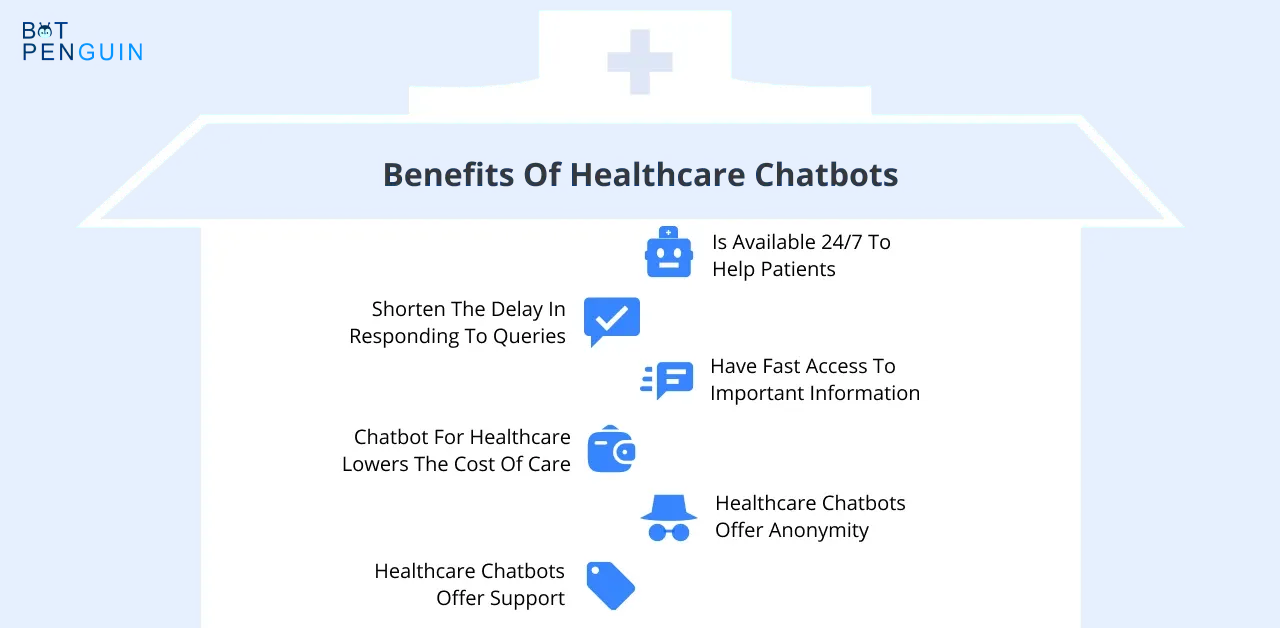
1. Chatbot for healthcare is available 24/7 to help patients
Healthcare chatbots can be available 24/7 to help patients with their healthcare needs.
This can be particularly useful for patients with questions or concerns outside of regular office hours or for those who simply prefer the convenience of accessing healthcare information and support at any time.
Healthcare chatbots can use language and tone that is engaging and easy to understand for patients.
Using natural language processing and machine learning algorithms, chatbots can analyze patients' input and respond in a way tailored to their individual needs and preferences.
This can make the experience of interacting with a chatbot more engaging and enjoyable for patients.
2. Chatbots for healthcare shorten the delay in responding to queries
Chatbots for healthcare can help shorten the delay in responding to queries.
Using natural language processing and machine learning algorithms, healthcare chatbots can quickly understand the intent behind a patient's question or concern and provide accurate, relevant responses in real time.
This can be especially helpful for patients who have urgent or time-sensitive health concerns and need quick answers from a healthcare provider.
Rather than waiting on hold to speak with a nurse or doctor, patients can simply chat with a healthcare chatbot to get the information they need.
3.Healthcare chatbots have fast access to important information
Healthcare chatbots may provide patients with essential information in a rapid and simple manner, including details on neighboring healthcare facilities, their operating hours, and pharmacies and drugstores for refilling prescriptions.
They can also be programmed to respond to specific inquiries concerning a condition.
4. Healthcare chatbots offer support
Healthcare chatbots are revolutionizing how we access and interact with healthcare services.
Imagine having a personal assistant at your fingertips that can answer all of your medical questions, schedule appointments, and provide emotional support whenever you need it.
These intelligent chatbots not only make healthcare more convenient and accessible, but they also offer a level of personalized care that was once unimaginable.
They can monitor your health status and encourage healthy behaviors, all while offering a friendly and approachable interface.
With healthcare chatbots, the future of healthcare is looking brighter than ever before, and we can't wait to see what other ways they'll help us take control of our health and well-being.
5. Chatbot for healthcare lowers the cost of care
Finding ways to save money without sacrificing the quality of care and service can be challenging.
Health chatbots can assist patients in avoiding pointless lab tests and other expensive procedures.
Patients may use healthcare chatbots to navigate the system more successfully rather than having to do it themselves and risk making costly mistakes.
6. Healthcare chatbots offer anonymity
While many patients value having a human aide, others would rather keep their information private.
Patients can share some medical information more freely with chatbots since they are perceived as non-human and non-judgmental, such as testing for STDs, mental health issues, sexual abuse, and other issues.
Use cases of healthcare chatbots
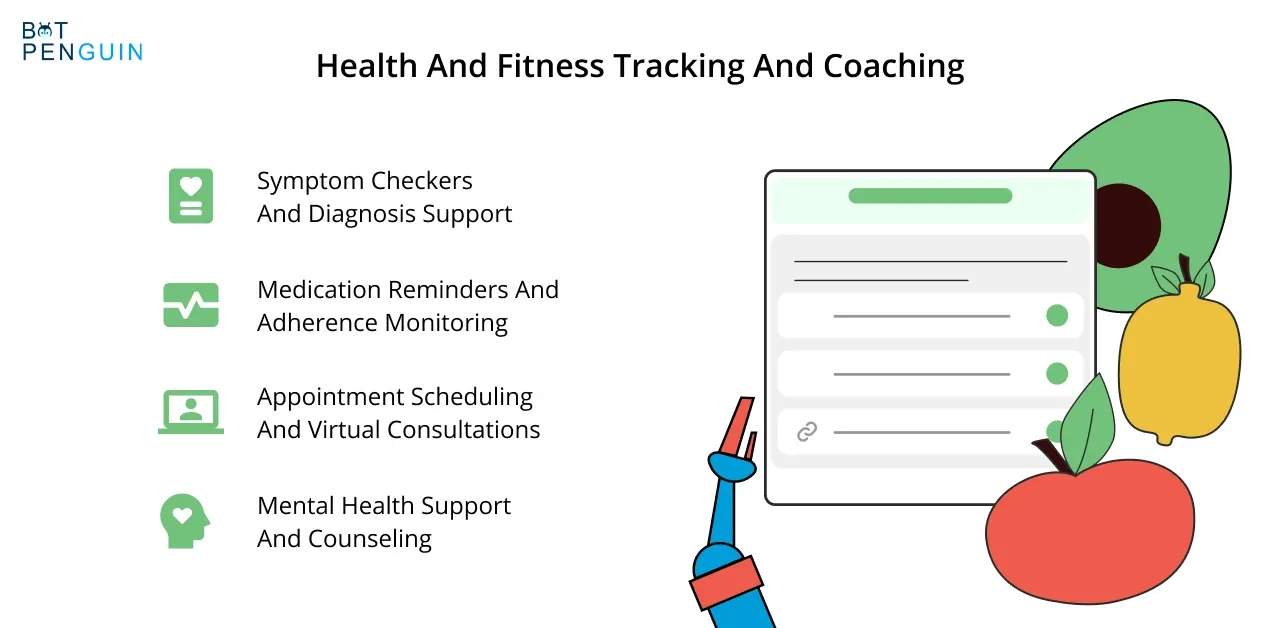
1. Symptom checkers and diagnosis support
Healthcare chatbots can assist in triaging patients by providing a symptom-checking and diagnosis support platform.
Patients can enter their symptoms, and the chatbot can provide possible diagnoses, advice on self-care, and recommendations for seeking medical attention if necessary.
This can help patients make informed decisions about their health and reduce the burden on healthcare providers by identifying patients who require urgent attention.
2. Medication reminders and adherence monitoring
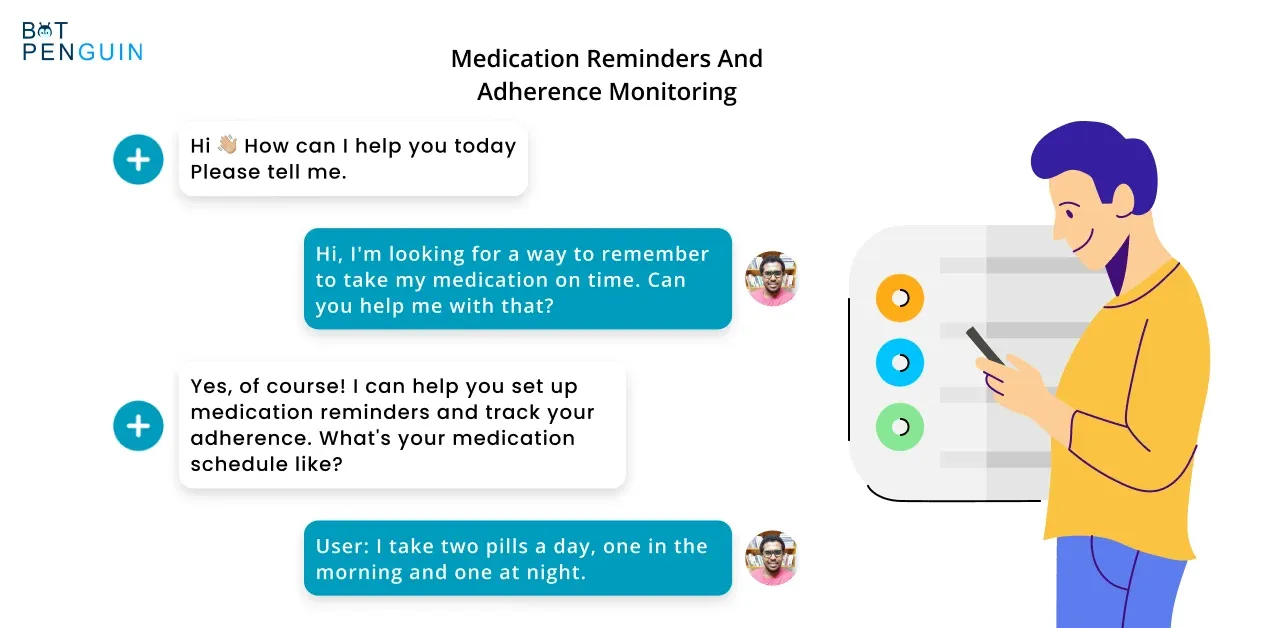
Healthcare chatbots can assist patients in adhering to their medication schedules by sending reminders at designated times.
Chatbots can also provide medication information and answer questions about side effects and drug interactions.
Adherence monitoring helps patients stay on track with their medication regime, and healthcare providers can use this information to adjust treatment plans as needed.
3. Mental health support and counseling
Healthcare chatbots can support and counsel patients with mental health concerns.
Chatbots can engage in conversations with patients, provide coping strategies and relaxation techniques, and refer patients to mental health professionals when necessary.
Chatbots can also help identify symptoms of depression or anxiety and encourage patients to seek professional help.
4. Appointment scheduling and virtual consultations
Healthcare chatbots can assist patients in scheduling appointments with healthcare providers.
Patients can enter their availability, and the chatbot can provide time slots for booking appointments.
Chatbots can also offer virtual consultations, allowing patients to receive medical advice and prescriptions from the comfort of their homes.
5. Health and fitness tracking and coaching
Healthcare chatbots can provide personalized health and fitness coaching by tracking patients' exercise and nutrition habits.
Chatbots can provide recommendations for healthy lifestyle choices, suggest healthy recipes, and track patients' progress toward their health goals.
This can help patients stay motivated and achieve their desired outcomes.
Top 5 platforms that can help create healthcare chatbots
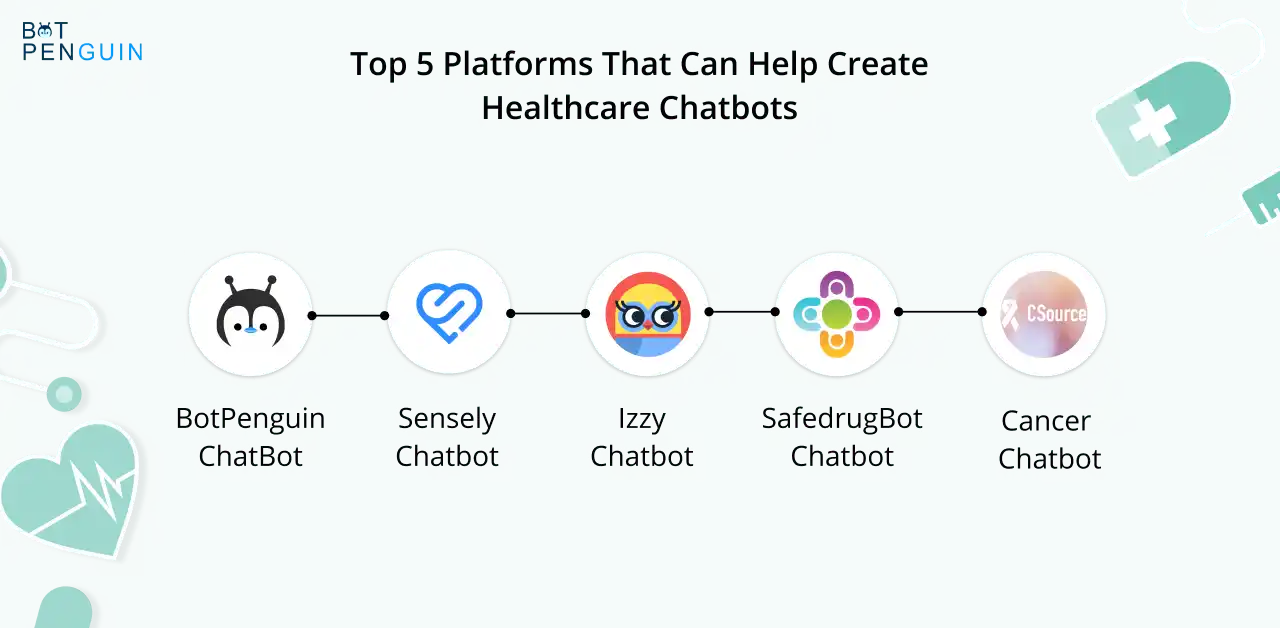
1. BotPenguin
BotPenguin AI-powered chatbot builder makes designing and deploying chatbots easy without any code necessary.
BotPenguin chatbots can answer customer queries, get leads, and provide customer support around the clock – all at a fraction of the cost of traditional customer service.
Additionally, you can manage it all with our simple, integrated system.
BotPenguin also provides near-zero-cost multichannel consumer engagement solutions.
With BotPenguin chatbots, you can help your patients' book appointments or reach out to a doctor in just a few minutes.
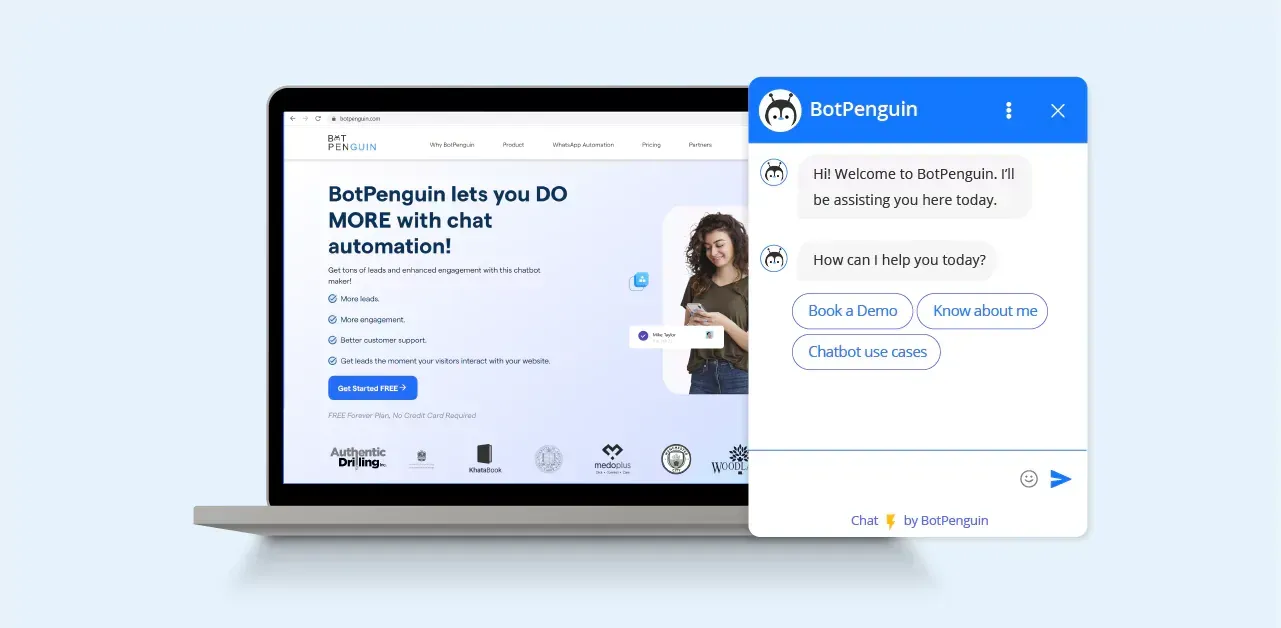
2. Izzy
A conversational virtual assistant designed to help women track their periods by providing information such as when to take birth control pills, fertility periods, and next period date.
3. Sensely
A multilingual platform that allows patients to track their health symptoms using text and speech.
It intelligently guides patients to insurance services and healthcare resources with content from the Mayo Clinic.
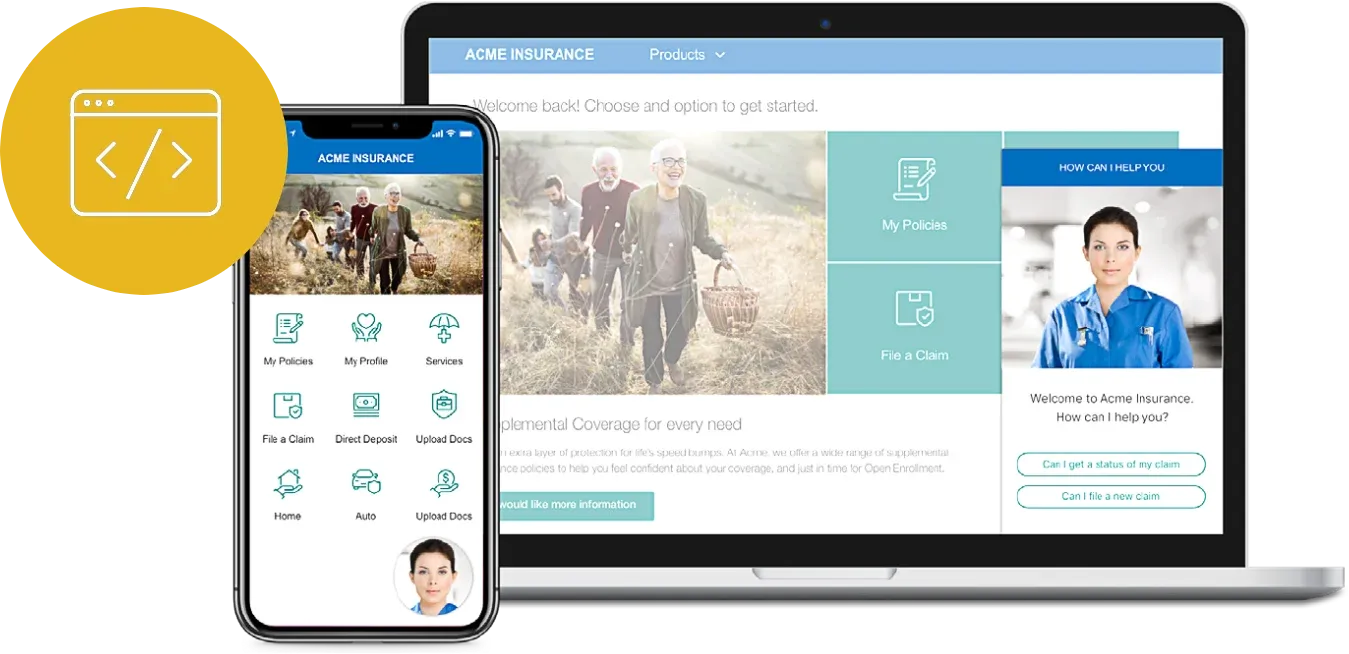
4. SafedrugBot
An assistant that provides medical users with accurate data through chat to help doctors in their daily work.
It assists medical providers in recommending the best medications to women during their breastfeeding phases.
5. Cancer Chatbot
A chatbot created by CSource to help patients detect signs of cancer by providing trusted information from its database.
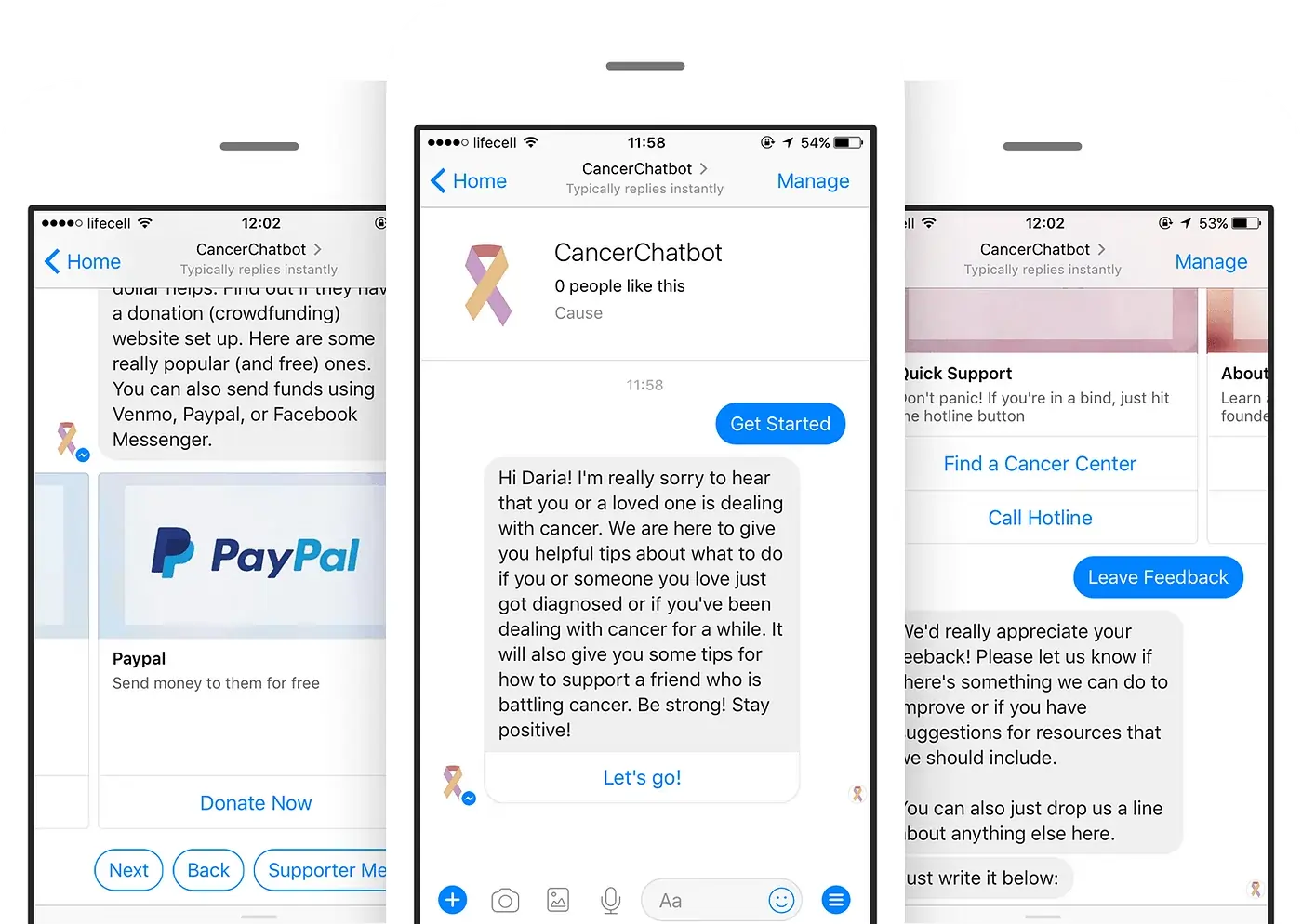
It can be used through Facebook Messenger and is helpful for people working in carcinogenic environments.
Challenges and limitations of healthcare chatbots
While healthcare chatbots offer various benefits, they also come with inherent challenges and limitations. Here are some key aspects to consider:
1. Privacy and security concerns
Healthcare chatbots require access to personal and sensitive medical information, such as medical history, symptoms, and test results.
This information must be protected to prevent unauthorized access or use by third parties.
Therefore, chatbots must comply with strict data privacy regulations or the General Data Protection Regulation (GDPR) in the European Union.
Chatbot developers must implement appropriate security measures to protect personal information, such as encrypting data during transmission and storage, implementing access controls, and regularly updating software and hardware to fix security vulnerabilities.
Failure to implement adequate data privacy and security measures can result in breaches, lawsuits, and reputational damage to healthcare organizations.
2. Lack of trust and transparency
Healthcare chatbots must earn users' trust by being transparent about their work and providing accurate and reliable information.
If a chatbot provides incorrect or biased information, users may lose faith in the technology and be reluctant to use it.
Chatbots must also be transparent about the data they collect, how it is used, and how users can access or delete their data.
This is crucial to ensure that users feel in control of their personal information and can make informed decisions about using the chatbot.
3. Inaccuracy and bias in diagnosis and treatment recommendations
Healthcare chatbots use machine learning algorithms to make diagnoses and treatment recommendations based on user inputs.
However, these algorithms can be biased or inaccurate if trained on limited or incomplete data or use flawed algorithms.
Inaccuracy and bias can lead to incorrect diagnoses, recommendations, or delayed treatment, potentially harming the patient's health.
Therefore, chatbot developers must ensure that algorithms are regularly tested and improved to reduce bias and improve accuracy.
Suggested Reading:
4. Limited ability to handle complex medical issues
Healthcare chatbots are best suited for handling simple medical problems, such as medication reminders or scheduling appointments.
They may not be able to handle more complex medical issues that require the expertise of a healthcare professional, such as diagnosing and treating severe medical conditions.
Therefore, chatbots should be used as a complementary tool to support healthcare professionals rather than as a replacement for human medical expertise.
Conclusion
Healthcare chatbots have become increasingly popular in providing patients with access to medical information and support in a conversational manner.
They offer 24/7 accessibility, reduced delays, fast access to important information, anonymity, and cost savings.
Healthcare chatbots have various use cases, such as symptom checkers and diagnosis support, medication reminders and adherence monitoring, mental health support and counseling, appointment scheduling and virtual consultations, and health and fitness tracking and coaching.
However, healthcare chatbots face challenges and limitations such as data privacy and security concerns, a lack of personal touch, and potential inaccuracies in medical advice.
Despite these challenges, healthcare chatbots have the potential to revolutionize healthcare delivery and improve access to healthcare services.
Are you tired of managing customer queries and leads manually?
With BotPenguin chatbots, you can automate your customer support and lead generation process, saving you time and increasing efficiency.
Our advanced AI technology ensures that your customers receive accurate and helpful responses 24/7, improving customer satisfaction and loyalty.
So why wait? Sign up for BotPenguin today!
Suggested Reading:
9 Innovative Ideas for Healthcare Chatbot Applications
Frequently Asked Questions (FAQs)
What are the benefits of using healthcare chatbots?
Healthcare chatbots provide instant access to healthcare information, personalized support, symptom assessment, appointment scheduling, and can reduce the burden on healthcare staff.
In which healthcare areas can chatbots be most useful?
Chatbots can be useful in various healthcare areas such as triage, mental health support, medication management, appointment reminders, patient education, and answering general health inquiries.
Can you provide examples of healthcare chatbot use cases?
Healthcare chatbots can be used for triaging COVID-19 symptoms, assisting in mental health screening, providing medication reminders, offering personalized health tips, and facilitating appointment bookings.
What precautions are taken to ensure the accuracy of healthcare chatbot responses?
Healthcare chatbots are trained on reliable medical sources, reviewed by healthcare experts, and continuously updated. However, it's important for users to consult healthcare professionals for precise diagnoses and treatment plans.
How do healthcare chatbots ensure patient data confidentiality?
Healthcare chatbots prioritize patient data confidentiality by adhering to privacy regulations, using secure connections, encrypting data, and limiting access to authorized personnel only.


